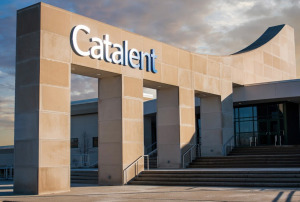
Corteva buys Houston-based plant biologics company for $1.2B
The acquisition is designed to accelerate Indianapolis-based Corteva’s biologicals business and make it one of the largest players in the market.

The acquisition is designed to accelerate Indianapolis-based Corteva’s biologicals business and make it one of the largest players in the market.

Corteva Inc., the Indianapolis-based seed and insecticide giant, is cutting 5% of its global workforce, or roughly 1,000 workers, as it reduces its portfolio of products and streamlines its operations.
It was supposed to be a “good-news” day for Indianapolis-based biotech Point Biopharma Global Inc. Instead, the company saw its stock get battered Monday, losing as much as 38% of its value, after it released a pair of announcements.
RayzeBio Inc., a private company founded in 2020 in San Diego, said it will invest in improvements and equipment in a former warehouse for e-commerce giant Amazon.com Inc.

City officials said Stevanato Group wants to increase its total investment in its Fishers plant to $512 million and its hiring plan to 515 employees. The facility is under construction near 126th Street and Cumberland Road.
BiomEdit, one of Indiana’s newest life-science companies, said Monday it will locate its headquarters in Fishers, but hinted it could eventually move to the new $100 million Elanco Animal Health headquarters campus now under construction in Indianapolis.
A panel of Indiana life science experts on Friday said the state could become more competitive for large investments and jobs if it doubled down on the kind of collaborations and partnerships that other states have used to their advantage.

The expansion comes on top of more than 1,000 positions the drugmaker has added since Jan. 1, 2021, bringing its current Bloomington workforce total to more than 4,000, which includes employees and workers provided by staffing agencies.
Prevounce Health, which launched in 2019 in Los Angeles, relocated its operations to Indianapolis last fall and just landed $4.5 million in investment funding which the company says will help it expand and double its workforce in coming months.
The university announced the gift Thursday morning from Jeff Albers, who graduated from the Kelley School in 1993, and his wife, Alison. Albers has spent more than 25 years in the biopharmaceutical industry.

Elanco Animal Health Inc. on Tuesday broke ground and shared new designs for its planned $100 million-plus global headquarters at the former General Motors Stamping Plant site just west of downtown Indianapolis.
Scientists said this full picture of the genome will give humanity a greater understanding of our evolution and biology while also opening the door to medical discoveries in areas like aging, neurodegenerative conditions, cancer and heart disease.
Krueger currently serves as chief operating officer at the 16 Tech Community Corp., which oversees the 50-acre 16 Tech Innovation District on the city’s near-west side.

The reproductive health unit includes products for obstetrics and gynecology, in vitro fertilization and assisted reproductive technology.

Pulmodyne, with offices and factory at 2055 Executive Drive, near the Indianapolis International Airport, has been expanding in recent years to meet a skyrocketing number of orders from the COVID-19 pandemic.
Sunnyvale, California-based Gener8 LLC has acquired RND Group, a 25-year-old software development firm headquartered in Indianapolis, the companies announced.
Orano Med LLC says the facility will be used to manufacture and distribute radiopharmaceuticals to treat cancer at hospitals throughout the country.
Coy, who has been at the organization since 2017, overseeing the first phase of development at the 50-acre 16 Tech Innovation District, is stepping down after a long career in economic development.
Genezen said the 75,000-square-foot addition will triple its current footprint.
Genome & Co. announced Thursday morning that it plans to establish a new 110,000-square-foot facility on 15 acres in the new Fishers Life Science & Innovation Park.